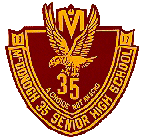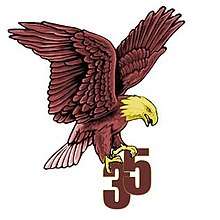McDonogh 35 High School
| McDonogh No. 35 Senior High School | |
|---|---|
 | |
| Location | |
|
4000 Cadillac Street New Orleans, Louisiana 70122 United States | |
| Information | |
| Type | Public; College Preparatory |
| Motto | A Choice, Not an Echo |
| Established | 1917 |
| School district | New Orleans Public Schools |
| Faculty | 48.93 (on FTE basis)[1] |
| Grades | 7 to 12 |
| Enrollment | 1008[1] (2010–11) |
| Student to teacher ratio | 20.6:1[1] |
| Color(s) | Maroon & Gold |
| Athletics conference | District: 9; Division: 4A |
| Sports |
Baseball (Boys) Basketball (Boys JV) Basketball (Boys Varsity) Basketball (Girls Varsity) Basketball (Middle School Boys) Basketball (Middle School Girls) Flag Football (Middle School Boys) Football (Boys JV) Football (Boys Varsity) Softball (Girls) Track and Field (Boys) Track and Field (Girls) Volleyball (Girls JV) Volleyball (Girls Varsity) |
| Mascot |
Roneagles  |
| Nickname | Thirty-five; Three Five |
| Website | mcdonogh.la.opc.schoolinsites.com |
McDonogh 35 College Preparatory High School, historically McDonogh No. 35 Senior High School, is a high school in New Orleans, Louisiana. It is a part of New Orleans Public Schools and it was named after John McDonogh. It was the first high school for African-American pupils in the State of Louisiana.[2]
History
Prior to 1917, during the era of segregated school systems in the Southern US, no public high school existed in New Orleans for African-American pupils. Those interested in pursuing an education beyond the eighth grade had to attend one of the city's three private secondary schools for blacks: Leland College, New Orleans University, or Straight College.
In 1917 a group of citizens met to petition the Orleans Parish School System to convert McDonogh 13 Boys' School from a white elementary school to a secondary educational facility for black pupils. The petition was granted and in the fall of 1917, McDonogh 35 became recognized as a four-year high school. McDonogh 35 remained the only public four-year high school for African Americans until the L. B. Landry transitioned from an elementary into a high school in 1942. Booker T. Washington also open their doors in 1942 for African Americans.
Over the years, McDonogh 35 has changed its location four times. The original building at 655 South Rampart Street was destroyed when Hurricane Betsy struck New Orleans in 1965, and for the next four years the school was temporarily located in the former United States Federal Court House Building at 600 Camp Street. In 1969, students and faculty were moved into the school facility at 133 St.Ann Street that formerly housed McDonogh 41 Elementary School. In September 1972, the facility relocated to 1331 Kerlerec Street in the Tremé neighborbood. During the 1992-1993 school year, McDonogh 35 was recognized as a National Blue Ribbon School of Excellence by the United States Department of Education.
By April 13, 2006 McDonogh 35 was one of six public high schools that had re-opened since Katrina. Of them, it was the only one in a Downtown neighborhood. According to Philip White, the principal, initially the administration had plans to accommodate 800 students but found fewer due to the effects of the hurricane. One month later, the enrollment went over 1,000 students and the administration was forced to stop accepting students.[3]
The current facility which opened on August 20, 2015 is located on 16 acres in the Bayou District at 4000 Cadillac Street, the former Phillips/Waters school site. The Louisiana Recovery School District allocated $55 million in Federal Emergency Management Agency recovery funds tied to this site to construct the new state of the art, college preparatory high school.
The "Roneagle"
The Roneagle is the mascot of the school. It was originally called an Iron Eagle but someone stole the "I" from the school. The "I" was made of iron. It was sold. Roneagle was also easier to pronounce.[4]
Academics
Christine Woyshner and Chara Haeussler Bohan, editors of Histories of Social Studies and Race: 1865-2000, said that "Despite the pressures of a state-mandated standardized curriculum and a corresponding accountability policy, in the late twentieth and early twenty-first centuries, McDonogh 35 retained a strong academic curriculum that placed social justice and students at its center."[2]
Notable Alumni
- Ernest Nathan Morial first African-American mayor of New Orleans, in office from 1978 until 1986.
- Israel Meyer Augustine, Jr. first black elected judge of Orleans Parish Criminal District Court.
- Rev. Abraham Lincoln "A.L." Davis founder of Southern Christian Leadership Conference and first black city councilman in New Orleans.
- Dr. Mack Justin Spears (Class of 1937) first black president of the Louisiana School Boards Association and first black to serve on the Orleans Parish School Board.
- Morris F.X. Jeff, Sr. former head of New Orleans Recreation Department's "colored" division.
- Joan Bernard Armstrong first female elected judge in Louisiana and first African American chief judge of the Louisiana 4th Circuit Court of Appeals
- Neil Smith (Class of 1984), former American football defensive end for the Kansas City Chiefs who played at the University of Nebraska and a two-time Super Bowl champion with the Denver Broncos.
- Dr. Calvin Mackie (Class of 1985), award-winning mentor, motivational speaker, and successful entrepreneur.
- Darryl Willis, Vice President in charge of claims for BP in the Deepwater Horizon oil spill[5]
- Michael Smith (sports reporter) NFL reporter for ESPN and a senior writer for ESPN.com
- Chris Clark (American football) (Class of 2003) American football offensive tackle who played at the University of Southern Mississippi and is currently a member of the Houston Texans.
- Cyril Hampton (Class of 1975), Guidance Counselor, Atlanta Public Schools. Two time Elementary Counselor of the Year, Past President of the Atlanta School Counselors and Atlanta Association of Educators, Board of Directors Georgia Association of Educators(2009-12).
- Gerald P. Wilson, P.E. (Class of 1988), Assistant County Engineer/Director - Traffic and Transportation Division - Fort Bend County. First black traffic engineering executive for the fastest growing county in the United States.
- Deborah Kellar Class of 1968, Actress, Member of Screen Actors Guild, and Artistic/Executive Director of Educational Theatre Institute and By Any Means Necessary Theatrical Ensemble.
- Michael S. Harrison (Class of 1987), Superintendent, New Orleans Police Department
- James Carter (Class of 1987), Former Councilman, City of New Orleans
- Jared Brossett (Class of 2000), Councilman, City of New Orleans
- Darryl Kilbert (Class of 1974), Former Superintendent of Orleans Parish School Board
- Dr. Eramus Felton First black student to earn a Doctoral degree in Mathematics from Tulane University
- Wesley Bishop Senator, Louisiana State Senate
- MGySgt Kevin Buckles (Class of 1987), Drum Major/Senior Enlisted Advisor, United States Marine Drum & Bugle Corps
- Delvin Breaux, NFL football player for the New Orleans Saints.
- Representative Sandra Seals-Hollins (Class of 1988), First African-American woman elected to the Utah State Legislature.
Notes
- 1 2 3 ""
- 1 2 Woyshner and Bohan, "Introduction." p. 11. "[...]in McDonogh #35 Senior High School in New Orleans. In 1917, McDonogh #35 was established as the first public high school for Black children in Louisiana."
- ↑ Troeh, Eve. "Many Children Still Lack Schools in New Orleans." National Public Radio. Retrieved on March 16, 2013.
- ↑ "About the School." McDonogh 35 High School. March 2, 2012. Retrieved on March 15, 2013.
- ↑ Rioux, Paul. "New Orleans native gives BP a friendlier face." New Orleans Times Picayune. Sunday June 27, 2010. Retrieved on March 16, 2013. "Willis, who grew up in Pontchartrain Park and graduated from McDonogh 35 High School, has quickly become one of the oil giant's most public faces."
- ↑ http://nutrias.org/~nopl/info/aarcinfo/notabl2.htm
Further reading
- DeCuir, Erica (2012). "Placing Social Justice at the Center of Standards-Based Reform: Race and Social Studies at McDonogh #35 Senior High, New Orleans, 1980–2000". In Woyshner, Christine; Bohan, Chara Haeussler. Histories of Social Studies and Race: 1865–2000. New York: Palgrave Macmillan. pp. 159–178. ISBN 978-1-137-00754-4.